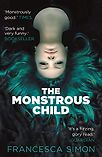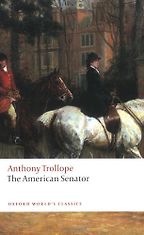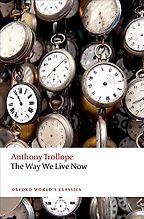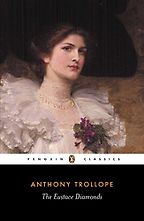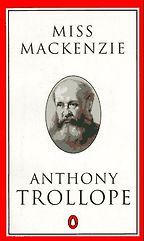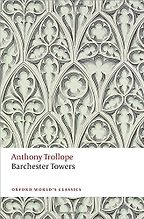Before we get to the books by Anthony Trollope you’re recommending, how did you get into him?
First of all, I should declare that I am passionate about Trollope and I’m also madly in love with him. He’s like my husband from another century. That’s Anthony [points at photo on her desk]. He sits on my desk. Look at him! So now that you know this fact…
Is it true that you’ve never read a Trollope?
Yes, it’s true.
[Big intake of breath]. Sorry, I need to compose myself, but just the shock of this news.
What happened was that I came to Oxford to do a second degree and someone that I was staying with, a family friend, mentioned Trollope. As a keen reader, I always had this policy that if someone mentioned an author I’d never heard of, I would read them. So, I picked one up and found it like a ‘guide for the perplexed’ about everything to do with British society.
Trollope is brilliant on class and money and the nuances of these things. I was very puzzled about the role of lawyers and doctors and how the whole class system worked. It was very, very confusing to me, but he was just great on social niceties.
The other thing is that he’s unbelievably pertinent, I think, especially to women. One of his big things is single women trying to get married and the marriage market in all its facets, where people are very blatantly trying to measure up: ‘Who could I get? How much money do they have? What’s their social status? What can I trade for that?’ I think that’s still relevant today, people do still weigh those things up, they measure social status, it’s just not so blatant. ‘I went to Yale. Oh, you went to Connecticut College? Hmmm. I see.’
He’s also brilliantly funny because he’s amused by these things. His sense of detail is great. Also, as a writer, I’ve learned a lot from him. He’s got this very warm relationship with his audience. He often will refer to ‘my reader’.
The other point about Trollope is that, even though the books are long, they’re brilliant if you are looking after small children, because like many Victorian novels, he’s really great at saying, ‘The reader will recall that last time we met Lady Carbury she was debating two offers of marriage’ and you go, ‘Yeah, right, I completely forgot that because it’s been a month since I’ve been able to pick up a book.’ So, they’re really good if you have to read in short snatches of time.
So, are Trollope’s books not hugely plot-driven then, if you can dip in and out of what Lady Carbury has been up to?
They are plot-driven, but they’re not suspenseful, in that sense. In fact, I tried to get my son to read a Trollope and he was just outraged. For one, that there was no map (he likes fantasy), and two, he felt there was no plot. He described it as ‘the Reverend Obadiah Slope gives a sermon that no one likes, 50 pages pass while everyone discusses this.’ That’s not entirely true, but it is more character-driven. It’s about how people make decisions. Tolstoy was supposedly a fan of Trollope and that doesn’t surprise me, because Tolstoy is also brilliant about how people make decisions and the back-and-forth of decision-making. Trollope is just incredible at getting inside people’s heads with all their vicissitudes. He’s a lot of fun. His set pieces are so witty and alert.
“He’s extremely readable. I could go so far as to say that he’s an easy read”
I’ll give you an example. In one of the books, Miss Mackenzie, Miss Mackenzie is trying to decide between three suitors and one suitor, sadly, is wearing bright yellow kid gloves. It’s a lapse of taste. What it says to her is that he’s not quite a gentleman. Trollope is great on those details.
The other thing it’s important to remember about Trollope is his absolute fixation on money. He was the first cousin of a baronet but grew up in the most precarious financial situation. His mother, Fanny Trollope, was a writer and supported the family because his father was useless. Trollope is brilliant at the small humiliations of not having enough money—while trying to maintain your position. That’s what we don’t see in Pride and Prejudice with the Bennett family. If Pride and Prejudice opened with Mr. Bennet’s death: that’s a Trollope novel. What happens to those girls in that family having to live on the charity of relatives, having to turn their gloves inside out? Which tradesmen do you pay? He’s very alert to that kind of fine detail of life.
I’m intrigued that you found Trollope useful as an American coming into 20th century Britain. You don’t just like Trollope’s books as novels evoking the Victorian age he was writing in?
Absolutely not. I was thinking about this today with the first book I chose, The American Senator.
Yes, let’s start looking at the books by Trollope you’re recommending, starting with The American Senator (1876).
The plot of The American Senator is about one of my favourite Trollope characters, Arabella Trefoil. Apparently, Edith Wharton based The House of Mirth’s Lily Bart on her. Arabella Trefoil is the impecunious niece of a duke and has been on the marriage market for 12 years. She’s been struggling to find someone appropriate. She’s tied to her mother who she hates. They’re always going to stay with people and way outstaying their welcome because they have no money. It’s just dreadful.
Then, at the end, when she does marry, she says, “She need never again seem to be gay in order that men might be attracted.” That made me think of that line in When Harry Met Sally when Marie—Carrie Fisher—says, “Tell me I’ll never have to be out there again.” It’s the exact same thing.
Of course, contemporary resonances are not all the same. Women had more limited options, but Trollope has got incredible empathy with this woman who is clever but has to make the social rounds to try to get some guy to marry her because he’s got money and her value is dropping in the marriage market.
Trollope is also very interesting on the decline of the aristocracy and the rise of the industrial class. Should the poor daughter of an aristocrat marry someone who’s coming up from the working class?
Which writer is he most like? Is he like Thackeray with Vanity Fair: are Trollope’s heroines more anti-heroines?
They’re complex heroines. I’ve seen Arabella Trefoil compared to Becky Sharp. But, in a way, Arabella’s position is a lot more precarious. Who is Trollope like? Probably he is like Thackeray, because he does have a great sense of humour. He’s really, really funny.
I was reading on the Trollope Society website that Queen Victoria thought he was absolutely hilarious—he made her laugh till she cried—but she also found him “rather wicked”.
He is wicked. He’s bitchy, that’s what Trollope is. All of his characters—or a lot of them—are always trying to get one up on each other but pretending to be polite. That was the other thing I found hard to understand about British people, as an American. They would say things like, ‘We must get together again sometime’, which is British for ‘I hope I never see you again’, but the first time someone said that to me, I pulled my diary out. It was like, ‘Oh my God, what did I just do wrong?’ Trying to understand what people are actually saying, that back and forth, Trollope helps with that.
“Trollope wrote to a stopwatch and compared being a writer to being a cobbler”
But one of the things that’s really great about Trollope as a writer is that he’s unexpected in his characters. So, most of the plot of The American Senator is about Arabella Trefoil deciding that she is going to try to snare Lord Rufford by pretending that he has proposed to her—because he kisses her in a carriage. Lord Rufford is only interested in smoking cigars and hunting and tries to extricate himself from this very difficult position because he doesn’t want to humiliate her but, on the other hand, he doesn’t want to marry her. But Trollope has these marvellous paragraphs where Lord Rufford goes, ‘Maybe I should marry her. She wouldn’t get in my way. I could go hunting. I could smoke my cigars.’ And, at the end, he marries someone who very firmly stops him from smoking his cigars, stops him hunting. He gets fat and is a little sorry that he didn’t marry Arabella, who would have just left him alone. I think that’s absolute genius. Trollope captures that, ‘How dare you do this to me? There’s no way I’m going to marry you! You’ve been on the market forever’ to ‘Maybe should I? Shouldn’t I? Maybe it would be a good thing to do. I’m going to have to get married. Would it be so terrible to be married to someone who would leave me alone?’ It’s cynical, but it’s funny. All his books have those unexpected moments, where a character does something that you don’t expect, and that’s my moment in The American Senator.
He’s trying to convey our deepest, darkest thoughts, the things we wouldn’t want to articulate publicly.
Absolutely and—unlike Jane Austen writing about two men alone—he writes about women alone all the time. He has no problem with that.
Trollope himself had the experience of someone trying to trap him into marriage. A landlady pushed her daughter in his way, hoping that she could burst in and compromise him and say, ‘Right, you’re engaged.’ Lord Rufford talks about himself as being hunted. He says, “one sometimes feels oneself like a carcass in the midst of vultures.” He kind of is. The other thing I really like about Trollope, as an American, is that these people have such a horror of commerce. And, yet, all they do is engage in commerce—except the goods they’re selling are their children.
But yes, Trollope does get inside what people are saying and thinking privately. It’s like a soap opera—in the best possible way—because the characters are incredible and their situations give huge importance to smaller things. In some ways, I always think of Trollope as a very feminine writer, he’s very involved with the domestic.
Is there anything more to say to about The American Senator?
I should say that the top plot of The American Senator is really dreary. It’s about an American senator coming over and getting involved in some legal case, to do with hunting. I can never remember what that plot is, because it’s just so inconsequential. There’s often two or even three plots going on in Trollope—it’s like an episode of Seinfeld.
So it’s not that you particularly appreciate the American senator’s perspective as the outsider’s view?
Trollope does do that. His American characters are always spirits of misrule, really. They turn up at inopportune moments and recall engagements that shouldn’t have happened. They’re normally financiers.
But it’s the subplot, the Arabella Trefoil plot, that’s just fantastic. She turns down a lot of people, in the assumption that there’s always someone better. The truth is, there isn’t always someone better. That’s another lesson of the book. It’s not a guarantee that if you turn down five proposals, the sixth one will be better than the previous five and, in her case, they start getting worse. The prey, the field, gets smaller.
As I said, Arabella Trefoil is probably my favourite Trollope heroine. It’s Trollope’s empathy with her, even though she’s supposed to be a fortune-hunter and an adventuress.
Let’s move on to the next Trollope book you’ve recommended: The Way We Live Now (1875), which I believe is his longest novel. Is it a real doorstopper?
This is the one I’ve read the most. I can show it to you, because I have all my Trollope Society editions here. It is pretty big, but his books are very easy to read. The books I’ve chosen are the ones that you can read on their own. They’re my favourites of the standalones.
The Way We Live Now is about a swindler or confidence trickster, Augustus Melmotte, who bears a strong resemblance to Robert Maxwell, if you remember him. It’s about an outsider who tries to make his way in British society and it’s all a house of cards. He’s trying to ramp up shares, he doesn’t have to put any money in and other people will take the hit, it’s about class and money and corruption.
Even though this trickster financier is dubious socially, he has a daughter, Marie, who is a massive heiress. And there’s somebody named Lord Nidderdale who is so dissolute that no one of his own class will have him. So, a marriage is arranged between Marie Melmotte and Lord Nidderdale which, of course, falls apart when her father loses most of his money.
And there’s this wonderful scene with Lord Nidderdale and his father—who can’t stand each other—about what he’s going to do now. And the father says to Lord Nidderdale, ‘How do you mean to live if you don’t marry her?’ He’s broke and he’s got to find someone rich and they have this incredible discussion about what’s available to him. There’s the Widow X. She’s got 8,000 a year. She’s 40, but… At the end Lord Nidderdale says, “It’s a pity there shouldn’t be a regular statement published with the amount of money, and what is expected in return. It’d save a deal of trouble.” That’s what I mean: it’s laid out there.
But again, I said how great Trollope is at the unexpected. When everything is falling apart, Marie Melmotte goes to see Lord Nidderdale and says, ‘I have no friends and I need some advice’ and they talk. They are these two children essentially—even though he’s probably 40—whose parents are moving them around like chess pieces. There’s this really nice scene—of kindness, really—as they try to work out what she should do. What should he do? Given that he’s such a miscreant, Lord Nidderdale has those moments. Trollope’s characters, even if they seem outrageous and two-dimensional, there’s always that extra thing that you’re not expecting.
Are Trollope’s books just satirical and funny, or do you get emotionally involved?
I feel emotional about the narrator. The huge emotion for me was when I finished The Last Chronicle of Barset. That was the end of six months’ of reading because I read all six Pallisers first. I was thinking, ‘Oh my God! I’m coming to the end of six months of reading 12 massive novels.’ And then, in the last paragraph, Anthony says, “And now, if the reader will allow me to seize him affectionately by the arm, we will together take our last farewell of Barset and of the towers of Barchester.” I just burst into tears because I felt like someone was talking to me from the grave. I was feeling so wistful and then this sentence just jumped at me, like he was by my side. It’s hard to explain, but it was very powerful.
But in terms of his characters, I think you do get emotionally involved. The former prime minister John Major has this thing for Lily Dale, who is one of Trollope’s most annoying heroines. Her fiancé dumps her and she decides she’s going to spend the rest of her life pining for him. I’m giving the keynote speech to the Trollope Society this year and I’m so annoyed that it won’t be in person, because I have been longing to grab John Major and say, ‘Why, why? Lily Dale! You’ve got to be kidding!’ So, yes, you do get emotionally involved with them, because they feel like real people. Though I’ve never burst into tears except that once.
I guess you were living in that world, you were living in Barchester?
I was totally living in that world. Trollope does talk to you all the time, which I like. Maybe some people don’t like it, but he’s got a wonderful narrative voice. It’s very friendly and it’s very compact. He’s like a companion. I was feeling that I was going to miss hanging out with him. That’s what it was. I felt I was leaving him.
His writing is very accessible—it’s not like you feel separated from him by 150 years.
You don’t at all. He’s extremely readable. I could go so far as to say that he’s an easy read. He’s got this easy flowing style and you get caught up in it very quickly. My father (the writer Mayo Simon) summed up Henry James’s novels to me as ‘Who gets the money? Who gets the girl?’ which is the plot of many Trollope novels too. Or, rather, who gets to keep the money? Who wants the money? Who doesn’t have the money? And who gets the girl?
Let’s move on to The Eustace Diamonds. This is one of Trollope’s Palliser novels, which you mentioned in passing before. Could you explain what they are?
The Barchester novels are his tales of clerical and ecclesiastical life and the Pallisers are the political novels and are all about power. The Eustace Diamonds is part of the Palliser sequence, but I read the Pallisers out of sequence and it was not a problem. The Eustace Diamonds, in particular, is a great one to start off with, because, again, it’s one of those wonderful heroines, Lizzie Eustace. She is a wealthy widow and she wants to keep this valuable family necklace—the Eustace Diamonds—and insists that her husband gave it to her. The family are furious. They want it back because it’s an heirloom.
There are also all these men who want to marry her because she’s gorgeous and sexy and rich, but she’s interested in her cousin, who is engaged to marry a mousy governess. Again, this cousin is trying to calculate, if he marries the mousy governess—who he does love—he’ll be stuck in a small house somewhere near the Swiss Cottage (Trollope is always very precise about London). This governess has got all the virtues, but does he want to be living in a small house near the Swiss Cottage (the equivalent of Siberia back then)?
“The other thing it’s important to remember about Trollope is his absolute fixation on money”
So in this book the heroine is a wealthy widow trying to hold on to the wealth that she has. She’s on her own, which does give her a lot of autonomy as she tries to make her way in the world. She is a schemer, because her husband didn’t give her the diamonds, but she persuades herself that he did.
The other reason this is a really good book is that I can never remember how it ends. Even though I have read it many times, it’s always a good one to reread because I can’t remember what happens. I have a feeling that Frank does go and marry Lucy Morris, the virtuous governess, but he’s probably sad that he’s ended up in a house near the Swiss Cottage when he could have been in Mayfair where he belonged.
Do Trollope’s heroines always have non-happy endings?
His heroine does usually get married, but it’s often slightly bittersweet. Arabella Trefoil does get married, but to a really pompous diplomat. She won’t be very happy, but it’ll be better than the life that she’s been living. It’s not like she marries her one true love. Sometimes the more minor characters, like little Lucy, the governess, do. There’s normally an impediment like someone is illegitimate or somebody doesn’t have any money, but their virtue shines through.
But where Trollope is really strong is with his adventuresses, his Arabella Trefoils and his Lizzie Eustaces. It’s kind of fun because they’re so scheming. They’re shameless. They just go for it and sometimes it’s heart-stopping: ‘Oh my God! She’s really going to do it. She is actually going to wear those diamonds at this event.’ How do you behave shamelessly and yet keep your reputation? It’s those important kinds of question.
Next up we’ve got Miss Mackenzie (1865). Who is she?
Miss Mackenzie is an old maid of 35. Poor Miss Mackenzie! She’s spent her previous years looking after ailing relatives—her father and her brother—and she gets left all this money. And she decides, ‘I want to live!’ So she goes to Bath with the intention of living and she eventually has three suitors. Trollope describes her as a thin and straggling old maid, but she’s grown into her looks a bit. Again, it’s about what she can hope for now, because she’s got money. Who’s an appropriate match?
It’s just fun to see this woman, who’s been living this drab, dreadful existence, getting left all the money. The rest of the family are furious that she’s got the money and they don’t, and she decides she’s going to have a good time, which she does.
She’s not a schemer?
No, not at all. She’s someone who has pretty much never been outside of her front door. She’s always been the dependent, the poor relation. The poor relation suddenly gets all the money and decides to go to Bath. She doesn’t really know what to do. She falls in with schemers, a number of people who—let’s just say—wish to relieve her of the burden of her wealth.
It is funny that she’s this poor old maid who at age 35 is absolutely beyond it. As a woman, it does make you very aware of the changes, hopefully, in our lives.
Are the Trollope books we’re discussing ranked in any particular order of preference?
No. I do think The Eustace Diamonds is a good one to start with. Barchester Towers as well, because it introduces you to a lot of his most famous characters.
Yes, so tell me about Barchester Towers (1857). In this novel he’s having lots of fun with clergymen.
It starts with the big question: the bishop has died, who’s going to get the job? And Archdeacon Grantly—who appears in many of the novels—is affronted to find out that they’ve brought in Bishop Proudie. He has an amazing wife, Mrs. Proudie, who tries to take over everything. It’s got one of my favourite sleazy characters, the Reverend Obadiah Slope (played by Alan Rickman when it was broadcast).
Five Books interviews are expensive to produce. If you're enjoying this interview, please support us by donating a small amount.
Barchester Towers has also got one of my favourite, favourite scenes in Trollope, which is when Miss Thorne gives a party. There are two marquees, one for the tenants of the estate, the farmers and below, and one for the gentry. But what about the people who don’t fit so neatly into those categories? Trollope is very interested in them. There’s a woman called Mrs. Lookaloft who, because her daughters have learned the pianoforte and she has named her farmhouse Rosebank, muscles into the gentry’s tent. And it causes consternation.
The scene is so funny. The tenants, the people below the ha-ha (which is a big ditch, that’s one word I learned from Trollope) are furious because she’s no better than them and they’ve all been mocking her about her daughters learning the pianoforte and her pretension in renaming her house. But then, suddenly, she’s with the gentry. She’s pushed her way in. And the gentry are appalled that this woman is invading their space. No one knows what to do about this breach.
They’re wonderful characters and they are genuine slices of life. They really are classy soap operas.
I just started reading Barchester Towers, and I already want to know what’s going to happen to Bishop Proudie.
You get sucked in so quickly and easily. I was looking through them again yesterday, in preparation for talking to you. I thought, ‘I’ll just remind myself quickly of Lord whatever-his-name-is’—because it can be hard to remember—and I just found myself reading them again. They are really fun. Once you read one, it’s hard not to read all of them. Well, maybe not all. There are 47 and I’ve probably read about 35.
What do you think Trollope was trying to do with these novels, what was on his mind?
Trollope wrote to a stopwatch and compared being a writer to being a cobbler. A lot of people made fun of him for that, and I just thought, ‘You are my hero! It’s a job and how great that you’re totally unpretentious about it.’ I admire Trollope’s interest in money and I also admire the way that he wrote 250 words every 15 minutes. He famously finished one novel and started the next one immediately. He’s so un-precious about himself, which is something I’ve really taken from him as a writer.
For most of his life Trollope worked fulltime at the Post Office. For a long time, he didn’t make money from his books. He would get up early to write, and then go and do his job. He wrote on trains, he wrote when he was travelling. He just fitted it into his life. It wasn’t like, ‘Oh I need to be alone. I need my separate space. ‘Servants! Look after me because the Muse has descended from Olympus!’ He was just very practical.
I think what he’s writing is a comedy of manners. But he’s also writing about the way the world is. He’s very alert to the changes in society, the Industrial Revolution and the declining power of the landed aristocracy, of which he was the poor cousin. He had to work. He’s the perfect person to be narrating these scenes. It is a real tapestry of Britain in the 19th century, but with a lot of things to say about our times as well. You learn a lot about life, really, and our lives, through reading someone like Trollope.
Interview by Sophie Roell, Editor
October 16, 2020. Updated: August 10, 2025
Five Books aims to keep its book recommendations and interviews up to date. If you are the interviewee and would like to update your choice of books (or even just what you say about them) please email us at [email protected]

